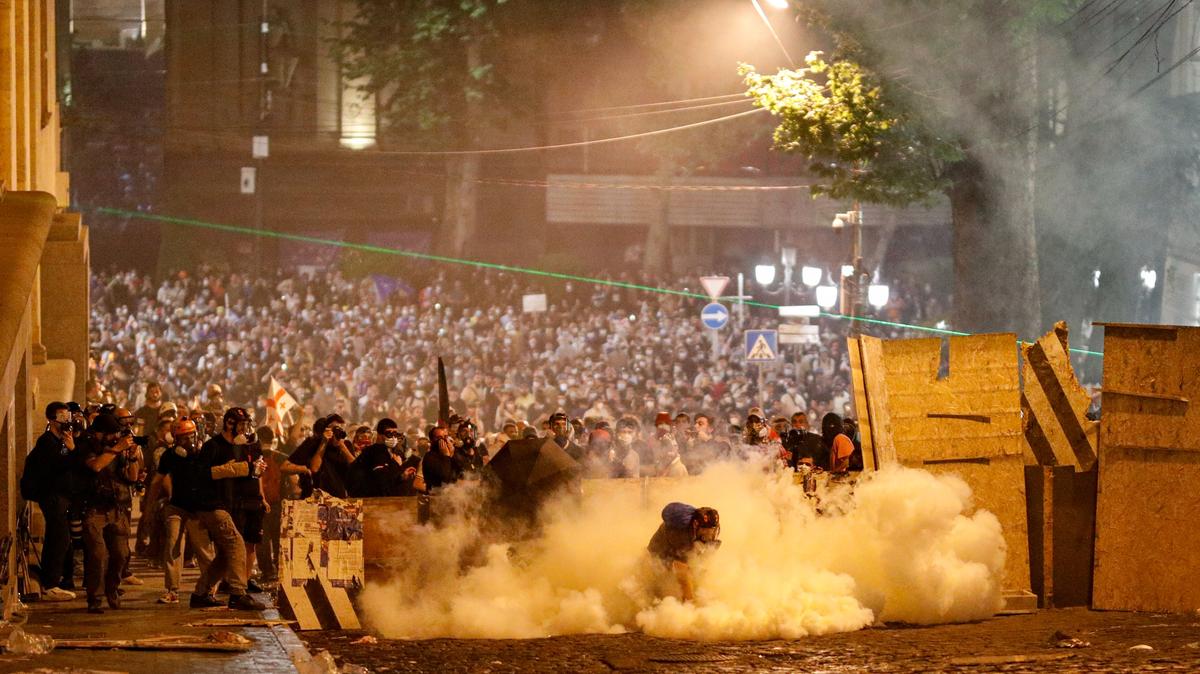After weeks of street protests and nationwide tensions, Georgia’s parliament finally passed a controversial law on “foreign agents” on 14 May. Mirroring the notorious 2012 Russian law that has since been used by the Kremlin as a tool to weaken civil society and silence independent media, the bill has prompted mass protests in the Georgian capital Tbilisi, spearheaded largely by students and younger people who see Georgia’s future squarely in Europe.
In April, the ruling Georgian Dream party re-introduced the so-called “foreign agents law” to parliament, having been forced to withdraw the bill last year following two weeks of widespread protests. The law requires any non-governmental organisation receiving more than 20% of its funding from abroad to identify itself as an “agent of foreign influence”, and has once again met strong resistance from Georgian civil society, and from younger people in particular.
Young Georgians frustrated with their government distancing itself from the West have been a permanent fixture in the continued demonstrations against the law over the past two months. One of the most striking examples of the government’s anti-Western shift came in a speech by Georgian Dream’s billionaire founder Bidzina Ivanishvili on 29 April, in which he accused a Western “global party of war” of conspiring to meddle in Georgia’s internal affairs.
“Our message is no to the Russian law, no to the Russian government, no to the Russian future of Georgia. Georgia won’t become part of the European family while activists are beaten up and people receive threatening phone calls,” one student named Luka said.
Over the years, young Georgians have become increasingly accustomed to the idea of their country’s ever-closer alignment with the West. In 2023 Georgia gained European Union candidate status, having made some progress on required democratic reforms. At the 2008 NATO summit in Bucharest, the country was also promised “eventual membership” of the defensive alliance. Many of this younger generation have come of age in an independent Georgia, have pursued higher education opportunities abroad or were raised by parents and grandparents who went to work in Europe and the US after the collapse of the Soviet Union in 1991.
Since 2000, any Georgian hoping to visit Russia has faced strict visa requirements, and though Russia’s last war with Georgia was 16 years ago, young Georgians continue to resent its lasting impact, namely that Russia still occupies some 20% of Georgian territory in South Ossetia and Abkhazia. For them, Russia is both a historic and present-day threat.
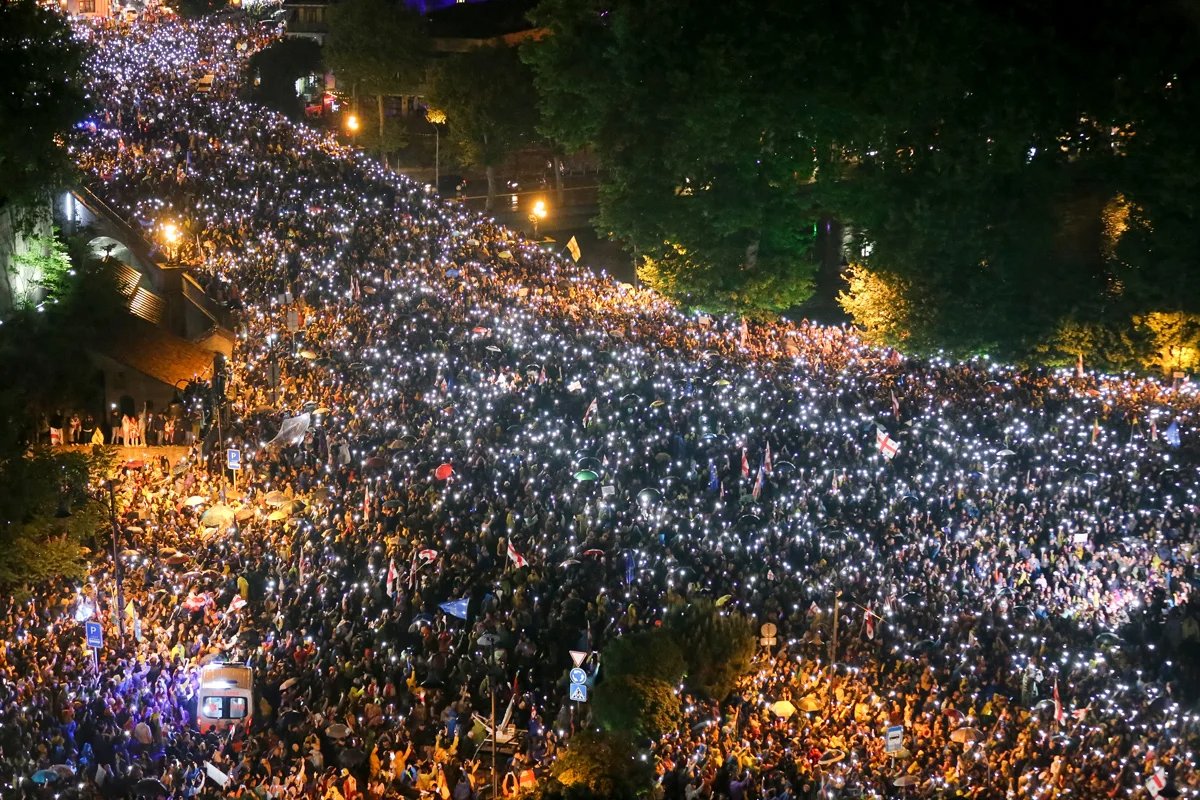
Protesters hold up their phones with the torches on during a protest against the bill in Tbilisi, Georgia, 11 May 2024. Photo: Zurab Tsertsvadze / AP Photo / Scanpix
After the outbreak of the war in Ukraine, anger at Russian expansionism has become even more pronounced. Approximately 100,000 Russians have relocated to Georgia since September 2022 to evade mobilisation, raising concerns of increased Russian influence in a country of just 3.7 million people — a potential fifth column that Putin could one day claim he needs to “protect” through military intervention.
Intimidation campaign
As Georgian Dream pushed the “Russian bill” through parliament, still unidentified perpetrators attacked government critics on numerous occasions in what appeared to be a well-orchestrated campaign of political intimidation.
Several prominent opposition politicians and protest leaders have been beaten outside their homes by masked thugs in recent weeks, and posters have been put up outside the offices of NGO leaders branding them “foreign agents” and “enemies of the state”, further borrowing the language of Stalinism that underpins both the Russian and Georgian versions of the legislation. Hundreds of activists and their family members have reported receiving abusive and threatening phone calls, sometimes for simply having attended protests against the foreign agents bill.
Georgian Dream has denied any connection to recent waves of violence in the capital, however, and Justice Minister Rati Bregadze went as far as to suggest that opponents of the bill may have beaten themselves up. “If such unrest benefits anyone, it is certainly those behind these protests," he said.
Earlier this month, the speaker of Georgia’s parliament, Shalva Papuashvili, announced government plans to launch a database of individuals who it claims have either threatened or engaged in violence during protests against the law.
Although Georgia’s Prime Minister, Irakli Kobakhidze, had previously said young protesters were being misled by “pseudo-liberal ideologies”, the unflagging tenacity of those protesting led Kobakhidze to invite participants to publicly debate the law.
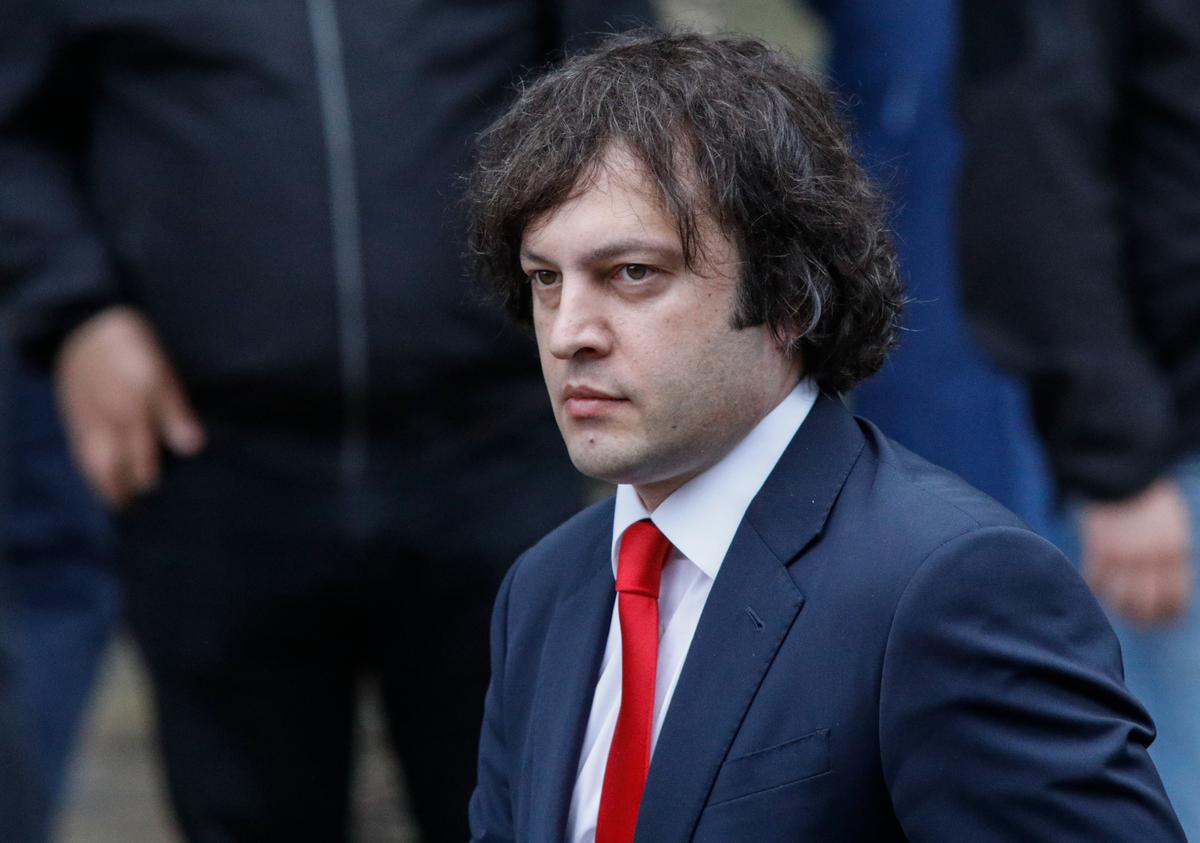
Georgia’s Prime Minister Irakli Kobakhidze attends Georgian Independence Day celebrations in Tbilisi, 26 May 2024. Photo: EPA-EFE / DAVID MDZINARISHVILI
Students were understandably sceptical of Kobakhidze’s offer given that Georgian Dream supporters on multiple occasions attacked students peacefully protesting against the “Russian law” outside Tbilisi State University (TSU), where Kobakhidze still lectures on law. The students eventually turned down the prime minister’s invitation to start a dialogue.
Student strikes
On 13 May, students from almost every major university in Georgia went on strike, boycotting classes and demanding the law be withdrawn from parliament. Student marches have regularly merged with the large-scale protests on Rustaveli Avenue, Tbilisi’s main thoroughfare.
“Our message is no to the Russian law, no to the Russian government, no to the Russian future of Georgia,” one student named Luka said, adding: “Georgia won’t become part of the European family while activists are beaten up and people receive threatening phone calls.”
Another student draped in the EU flag said: “We don’t want to go to Russia, we don’t want to go back to communism.”
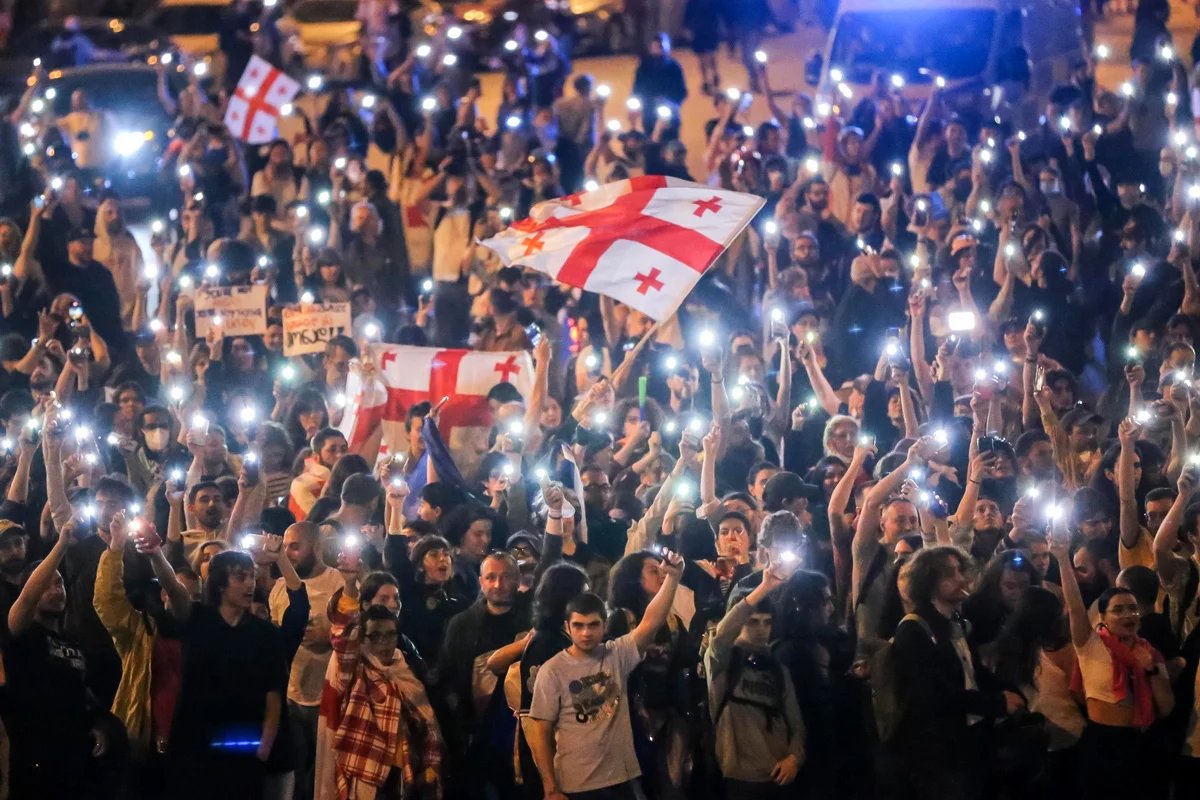
Demonstrators protest against the foreign agents bill in central Tbilisi, Georgia, 2 May 2024. Photo: Zurab Tzertsvadze / AP Photo / Scanpix
The students are not alone in standing against this legislation. More than 200 professors and lecturers at TSU have signed a statement supporting the protestors and calling for the government to abandon the law. Administrators have reportedly even rearranged exam and class schedules to allow students to attend protests.
This stance is not universally shared in Georgian academia, however. On 14 May, clergy members representing some 38 Georgian universities signed a joint statement criticising the students for rallying, saying that they believed that “political protest should remain outside the academic and educational space”.
International response
Reaction among Georgia’s nominal allies has been swift and unequivocal. Just hours after the Georgian People’s Act was introduced, US Secretary of State Antony Blinken announced the imposition of travel bans on “individuals who are responsible for or complicit in undermining democracy in Georgia, as well as their family members”.
Last week US lawmakers also introduced the Georgian People’s Act to the Senate in response to the law. The bill mandates a pause to all US funding for the Georgian government, while also authorising at least $50 million (€46 million) in new funding to support democracy and rule of law projects in Georgia. The Georgian Dream party has condemned the proposed measures and described them as “blackmail”.
Reaction among Georgia’s nominal allies has been swift and unequivocal. Just hours after the Georgian People’s Act was introduced, US Secretary of State Antony Blinken announced the imposition of travel bans on “individuals who are responsible for or complicit in undermining democracy in Georgia, as well as their family members”.
Last week US lawmakers also introduced the Georgian People’s Act to the Senate in response to the law. The bill mandates a pause to all US funding for the Georgian government, while also authorising at least $50 million (€46 million) in new funding to support democracy and rule of law projects in Georgia. The Georgian Dream party has condemned the proposed measures and described them as “blackmail”.
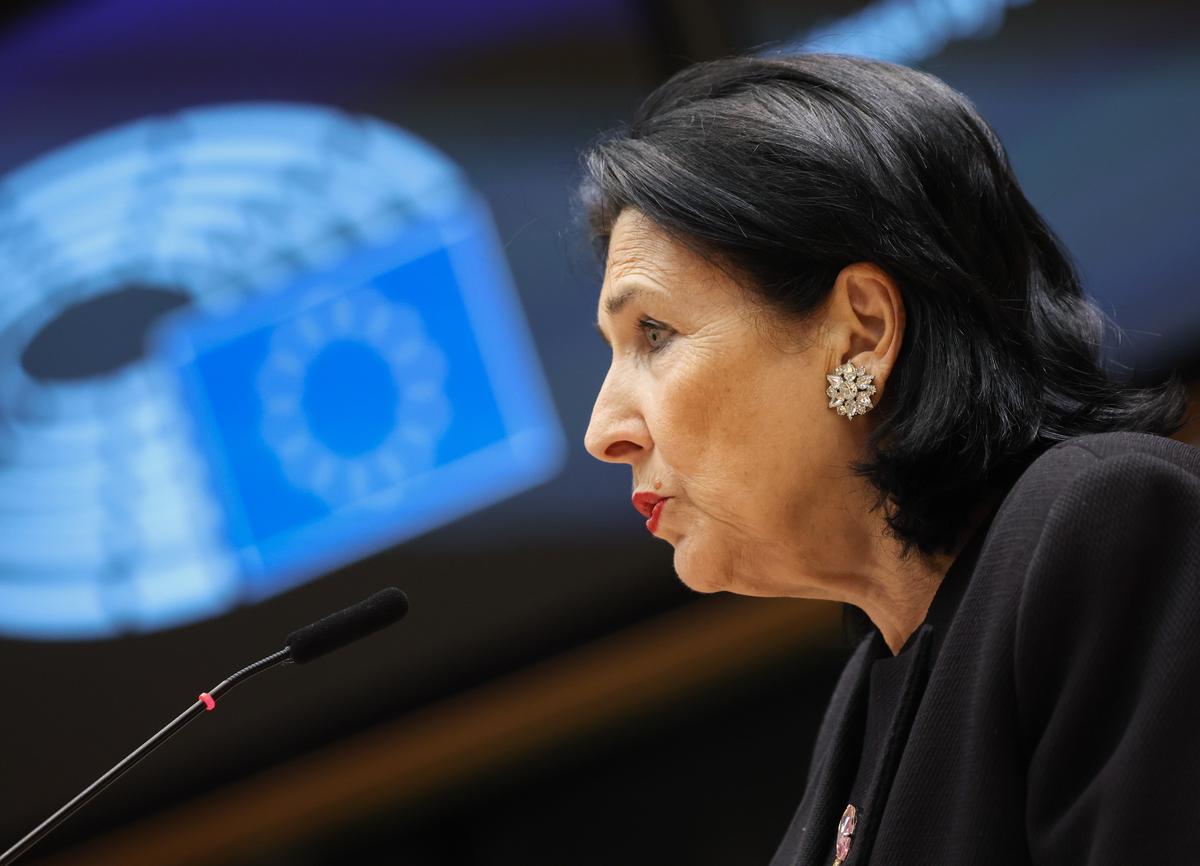
Georgian President Salome Zourabichvili addresses the European Parliament in Brussels, 31 May 2023. Photo: EPA-EFE / OLIVIER HOSLET
The opposition was supported by Georgian President Salome Zourabichvili, who vetoed the law on 18 May. “This law, in its essence and spirit, is fundamentally Russian, contradicting our constitution and all European standards. It thus represents an obstacle to our European path,” Zourabichvili said.
However, since a constitutional amendment was approved in 2010, a presidential veto in Georgia can be overridden with a simple majority in parliament, and Georgian Dream, which has 87 of the 150 seats in parliament, duly overrode Zourabichivili’s veto on Tuesday.
Although opposition parties in Georgia remain marginalised and fragmented, and the country’s former president, Mikheil Saakashvili, remains in prison on what are widely seen as politically motivated charges, nearly 90% of the Georgian population supports the country joining the European Union. Despite the unequivocal popularity the country’s evental EU membership enjoys, Georgia’s government seems willing — or even keen — to jeopardise that plan. It’s for that reason that students and young people in Georgia see the battle over this law as an existential one, and one in which their own future is ultimately at stake.
